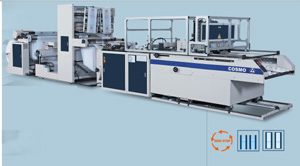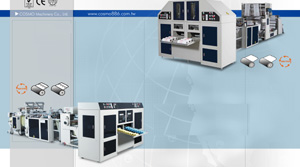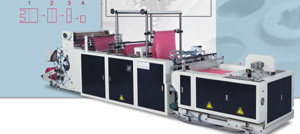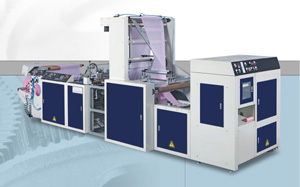Cosmo Machinery Co., Ltd.
Plastic bag- making machines
2009/06/25 | By Ben Shen | COSMO MACHINERY CO., LTD.As globalization continues to take hold, established suppliers from developed economies seek to be more competitive by re-locating to emerging nations to cut cost—hence incurring inevitable technology transfers—which then upgrades the overall production quality, professionalism, and even helps to achieve economies of scale. The consequence tends to be that manufacturers and suppliers in emerging nations manage to stand up more effectively on their own. That spells intimidating news for, in this case, the makers and suppliers of bag making machinery in Taiwan. Again, the consensus in the industry is to build a wall of technology to keep out the lower-rung rivals, who generally have little option but to turn out relatively more rudimentary machinery.

Despite the increasingly intense competition from emerging suppliers, Cosmo Machinery Co., a leading manufacturer of plastic bag-making machines in Taiwan, has, over the past five years, gradually taken steps to transform itself into a supplier who places more emphasis on technology—via investing more in R&D. The company says it has been able to upgrade its expertise in developing uniquely designed machines coupled with total solutions to meet customers’ requirements from around the world.
Cosmo was founded 14 years ago as the Throne Machinery Co. and restructured by moving to Shulin, an industrial suburb in Taipei County, northern Taiwan about seven years ago. At present, the company’s bag-making machinery line can be roughly divided into three groups: the first to produce garbage bags, the second T-shirt bags, and the third to hold produce.

The company says 70% of its capacity handles self-developed plastic bag-making machines, with the remainder turning out dyeing and finishing equipment and vacuum packaging machines on the OEM (original equipment manufacturer) basis. These machines can make bags made of OPP (oriented polypropylene), PP (polypropylene), HDPE (high-density polyethylene), LDPE (low-density PE) and PLA (polylactic acid) material. The company became CE-mark and ISO9001:2000 certified in 2006.
Dedication is the Key
Lu Li-teng, general manager of Cosmo, says he has recognized that dedication to technology development will be a decisive factor for domestic manufacturers in this line to stand out from the world arena. For instance, the company has adopted servo driven system in its products to develop state-of-the-art machines since its inception.

“Over the past few years, I have been traveling all around the world to look into the latest technological development in this line and found that only producing uniquely-designed machines can help Taiwan manufacturers evade the often mutually-destructive underselling when one tries to compete price-wise against developing nations, especially when the relatively high labor rates in Taiwan no longer allow labor-intense production,” comments Lu. “It’s easy for machinery manufacturers, especially those from mainland China and India, to move into the field to produce conventional plastic bag-making machines, but they have a long way to go before being able to develop fully automated, high-speed machines.”
Servomotor-driven; PLC devices
Cosmo boasts all of its products are servomotor driven, rather than the conventional clutch brake, with Japan-made high-tier PLC (programmable logic control) devices that can boost the operating speed of the machines, as well as steadiness and reliability. “In the past, we used domestically made PLC system but experienced a 30% defect rate; however, adopting Japan-made ‘Omron-branded PLCs’ a few years ago has helped us to lower such rate to only 1% to 2%,” says Lu.

Lu says the high degree of steadiness in machinery has won Cosmo high degree of acclaim from customers. “When designing machines, I always give first priority to customers’ profitability because, I deeply believe, it can help us secure continued inflow of orders and our growth should rely on customers’ confidence,” explains Lu.
Based on the specialization in controlling servomotor-driven system, Cosmo is capable of designing reliable plastic bag-making machines with high degree stability.
To focus on the production of reliable products, the company has adopted a computerized graphic-drawing system with fully automatic production procedure. The company says it adopts a stringent inspection procedure in all production processes from design to assembly and packaging.
Up to German Standards
At present, the company’s plastic bag-making machines have a capacity of 300 cycles per product along two lines per minute, which can compete with those made in even industrialized nations such as Germany. The noteworthy aspect is that, despite featuring German-quality, the company’s plastic bag-making machines sell for much lower prices than those made in Germany.

The company says all of its plastic bag-making machines are controlled by a power computer system across the entire manufacturing process, from film rolling through to finished products. The servomotor equipped in the machine serves as a standard attachment for making it easy to adjust the bag length and the production speed. The machine will automatically stop when film feeding blocks or bags jam, and even when abnormal colors in bags are spotted during scanning.
So far since its inception, the company has developed 16 models of plastic bag-making machines in addition to six models of dyeing and finishing machines. To meet the requirements of the ever-changing plastic-bag arena, the company will speed up the pace of developing innovative products in the years to come.
The company says it has an in-house R&D team to sustain its fast development of innovative machines. With high capacity in integrating electric-control systems matching with machines, the R&D team is capable of developing complex machines with strong performance to facilitate production of complicated plastic bags. “Of course, the development time depends on the complexity of the desired machines,” Lu explains. “Sometime we have to spend almost one year to complete the development of a reliable machine involving very complicated operating procedures. Accordingly, we won’t begin development work for the complicated machines unless customers place orders.”
Backed by a dedicated in-house R&D team, Cosmo usually introduces one to three new machinery models per year. In 2008, the company will debut two new models, one to produce complex garbage bags and the other to hold produce.
Enhancing Marketing Clout
On top of placing extra emphasis on technological development, the company has also not neglected to hone its marketing prowess, a strategy generally agreed by savvy businesspeople to be equally important as offering technological innovation and ingenuity. After bringing onboard new customers from East Europe by taking part in renowned international shows such as the K Show held in Dusseldorf, Germany in October 2007, Lu has been convinced of the importance of enhancing marketing strength, hence resolving to step up after-sale services so that global customers may be served promptly and professionally. The company claims that five new customers met at the Dusseldorf K Show have already placed orders.
“Our products have been distributed to more than 60 nations worldwide, but I believe there are still plenty of windows of opportunities to be opened in emerging markets,” Lu says. “Besides, I believe good products should be promoted with the backup of a strong marketing team. At present, our company has three marketing specialists who speak Turkish, Spanish and English, making our team truly cosmopolitan and be able to communicate with customers from the Middle East and Europe. In the year to come, we will recruit two more marketing specialists to further enhance our team efficiency to develop emerging markets.”
The company says it has set up overseas sales agencies in 10 nations to sell plastic bag-making machines. “In the first years of our establishment, we concentrated on only T-shirt plastic bag-making machines,” explains Lu. “Over the past four or five years we began developing other types of plastic bag-making machines, including those to hold garbage and produce. Having developed upscale models and machines with higher margins has enabled us to easily establish overseas sales agencies; while we aim to further expand marketing networks in the future.”
Believing that diversifying his customer base will help to assure sustainable growth in sales, Lu has set a goal to secure at least 10 new customers every year.
Growth in Volume, Not Value
Thanks to the introduction of new types of machines and the enhancement in marketing strategy, Cosmo saw sales grow 30% year-on-year in 2006. But affected by the rise in the prices for such materials as iron and steel plates, the company saw a flat performance in sales value in 2007, despite a 10% annualized growth in sales volume. “Although the prices for raw materials have skyrocketed to an unbearable level, we still keep our products at the original price tag because we don’t want to disturb our customers in marketing strategy and stand to our belief of helping customers make profits.”
Lu says the only way to keep profitability is to step up the pace of developing innovative products with strong performance. “Developing innovative products will not only keep our competitiveness in the international marketplace but also help push us to the top of industrial pyramid,” Lu states.
To realize the capacity to effectively meet the special requirements of new customers, Cosmo has mapped out a plan to move to a new production site, possibly near the present one. If the plant-relocation plan is materialized in the foreseeable future, the company will be able to streamline as well as boost production capacity effectively.
Cosmo Machinery Co., Ltd.
No. 1-20, Alley 110, Lane 181, Sec. 3, Chiayuan Rd., Shulin City, Taipei Hsien, Taiwan
Tel: 886-2-2680-6116, 2668-5886
Fax: 886-2-2680-6118
http://www.cosmo886.com.tw
E-mail: [email protected]

